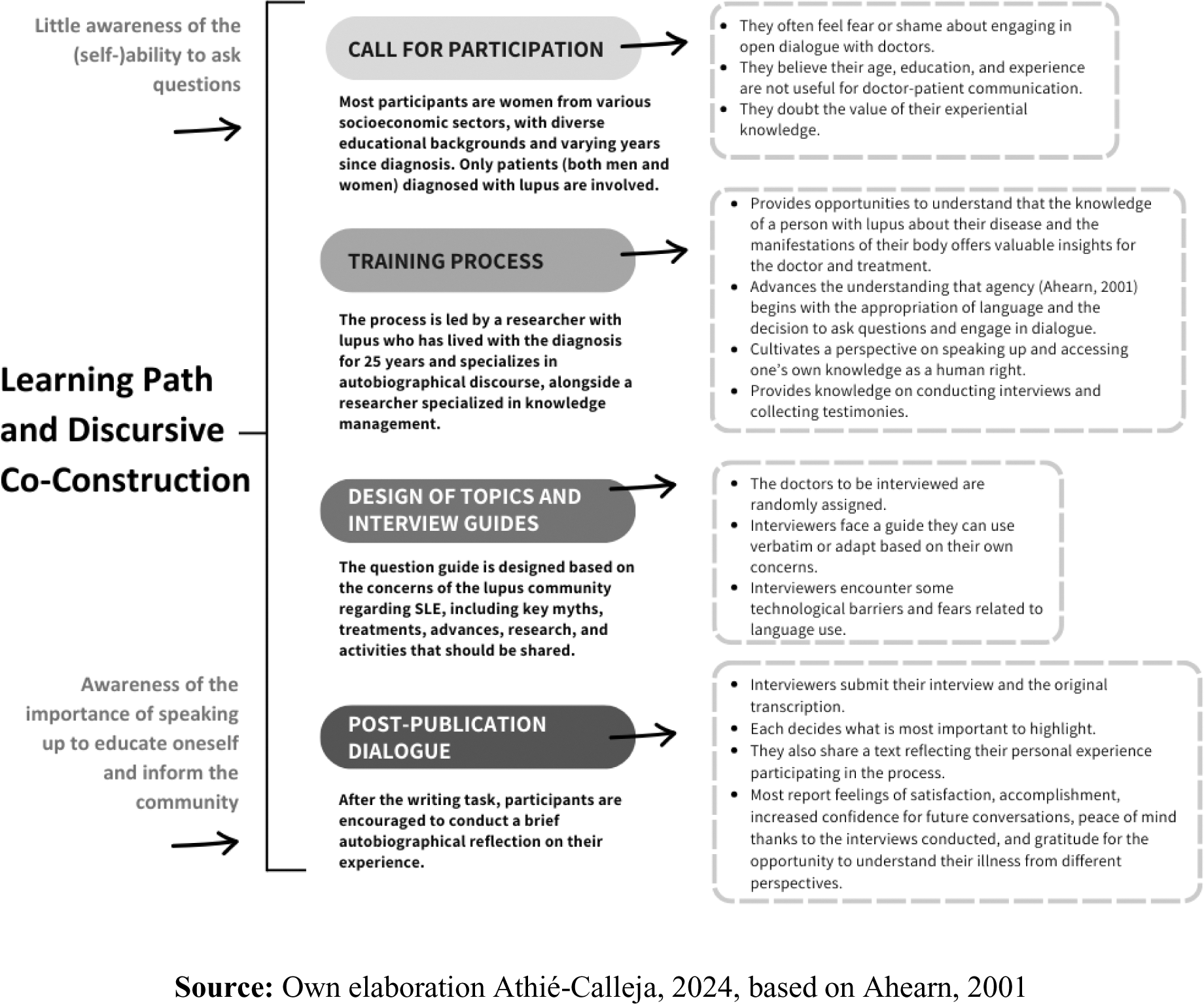

Background: One of the greatest challenges in doctor-patient communication for individuals with lupus is achieving full communication that enables patients to understand the disease while using appropriate language that does not cause emotional distress for those conveying or treating the condition. Lúpica: Experiences, Knowledge, and Territories of Lupus is a narrative-reflective publication written by people with lupus who engage in dialogue with their doctors as equals, aiming to explain and contextualize all aspects related to the disease. Developed in Mexico with an international perspective, it becomes a thematic catalog constructed through life stories, efforts, policies, narratives, research, challenges, proposals, and aspirations of everyone connected to lupus. As a result, it addresses experiential, medical, testimonial, clinical, academic, scientific, economic, artistic, therapeutic, maternal, familial, sexual, activist, and supportive dimensions. This magazine edited by Cetlu — digital, downloadable, and free — seeks to document the realities of lupus and build a collective memory from a social perspective. To achieve this, it is developed through a training process for patients before they engage with doctors, specialists, and families. This approach encourages the active participation of people with lupus in generating questions linked to their interests and in creating educational content designed for the community.
To build bridges between the experiential knowledge of the patient and clinical knowledge to support epistemic horizontality
To encourage the active participation of people with lupus, not only as readers or sources of information but also as producers of educational and reflective content, moving beyond mere testimonials
To establish training processes that provide tools, language, and experiences to strengthen agency among people with lupus through critical thinking and a deeper understanding of their disease
To foster reflective processes in people with lupus by inviting them to conduct interviews, seek information, document events, and process the desired information
To provide the magazine’s readership with tools for understanding the disease and all the domains that must be explored to foster community-oriented thinking
Methods: Through a qualitative design based on Participatory Action Research (PAR), the Lúpica magazine is analyzed as a documentary-educational tool. This approach combines training and active observation to identify the dynamics through which participants develop agency by engaging in face-to-face dialogues with healthcare professionals, exploring the social, legal, emotional, and occupational implications of lupus. At the same time, it documents how readers transform their understanding of the disease as they discover new ways to confront and live with it.
Results: Through their participation as part of the content creation team, a group of 23 people with lupus from Mexico, Chile, Venezuela, the United States, and Guatemala have developed agency from their enunciative position, transitioning from passive listeners to individuals capable of engaging in dialogue with medical professionals in the co-construction of a message with communal value (see Figure 1). The participants have found ways to articulate the disease from perspectives beyond the purely clinical, employing discursive tools to address SLE from social and human dimensions, placing the individual at the center. This is a bottom-up construction that challenges the traditional vertical knowledge hierarchy. For readers, agency has taken an epistemic form: they have enhanced their understanding and perspective on the disease.
Agency Development through the Co-Construction of Educational Discourse on Lupus between Patients and Doctors. Source: Own elaboration Athié-Calleja, 2024, based on Ahearn, 2001

Conclusion: Lúpica is an editorial platform that fosters educational processes through the convergence of knowledge, experiences, and discourses. Participants exhibit particular characteristics:
They adopt a language related to the disease, enabling them to understand and explain their experiences and what happens in their bodies;
They perform an enunciative stance free from the fear of asking about treatments, consequences, and medical possibilities, establishing constructive dialogues with the clinical side;
They begin to develop independent leadership actions in communication with their peers, groups, and communities
This has enabled their involvement in activism, education, policymaking, and research related to lupus. Additionally, the medical community has discovered a new way to understand their patients’ dialogues and thoughts. This dynamic underpins and strengthens conscious agency in doctor-patient interactions, both for people with lupus who collaborate in content creation and for those who read the magazine and discover new pathways to broaden their perspectives on the disease.
REFERENCES: [1] Ahearn, L. M. (2001).
Language and agency
. Annual Review of Anthropology, 30, 109–137.
[2] Austin, J. L. (1955).
How to Do Things with Words
. Electronic edition by
[3] Belli, S., & Íñiguez, L. (2008). Emotions and language: The concept of “performance” in the Membership Categorization Analysis.
Proceedings of the VIII Congress of General Linguistics 2008
. Autonomous University of Barcelona.
Acknowledgements: NIL.
Disclosure of Interests: None declared.
© The Authors 2025. This abstract is an open access article published in Annals of Rheumatic Diseases under the CC BY-NC-ND license (